What are Social Skills?
See also: Life SkillsSocial skills are the skills we use to communicate and interact with each other, both verbally and non-verbally, through gestures, body language and our personal appearance.
Human beings are sociable creatures and we have developed many ways to communicate our messages, thoughts and feelings with others.
What is said is influenced by both verbal language and the way we use it - tone of voice, volume of speech and the words we choose - as well as by more subtle messages such as body language, gestures and other non-verbal communication methods.
The fact that some people are better 'social interactors' than others has led to detailed investigations into the nature and function of interpersonal interaction.
Developing social skills is about being aware of how we communicate with others, the messages we send and how methods of communication can be improved to make the way we communicate more efficient and effective.
There are distinct advantages to having well developed social skills.
Here are five:
1. More and Better Relationships
Identifying well with individuals leads to more relationships and, at times, friendships.
By developing your social skills you become more charismatic, a desirable trait . People are more interested in charismatic people as charismatic people are (or at least appear to be) more interested in them.
Most people know you cannot advance far in life without strong interpersonal relationships. Focusing on relationships will help you get a job, get promoted and make new friends. Well honed social skills can increase your happiness and satisfaction and give you a better outlook on life.
More relationships can also help to reduce the negative effects of stress and boost your self-esteem.
2. Better Communication
Relating with people and being able to work in large groups naturally develops one's communication skills.
After all, you can not have great social skills without good communication skills and being able to convey one's thoughts and ideas may be the single most important skill that you can develop in life..
3. Greater Efficiency
If you are good with people, you can more easily avoid being with the people you do not like as much as others.
Some people dread social interactions because they do not wish to spend time with individuals who do not have similar interests and viewpoints. It is a lot easier to attend a meeting at work or a party in your personal life if you know at least some of the people who will be there.
If you are in a social situation and do not want to spend time with 'John' because you don't like him or he cannot help you with a particular issue, a good set of social skills will allow you to politely convey that you need to spend time with other people at the get together.
See our pages improving self-esteem and building confidence.
4. Advancing Career Prospects
Most worthwhile jobs have a 'people component' and the most lucrative positions often involve a large amount of time spent interacting with employees, media and colleagues.
It is rare that an individual can remain isolated in their office and still excel in their job. Most organisations are looking for individuals with a particular, tactical, skill set: the ability to work well in a team and to influence and motivate people to get things done.
See our pages: Employability Skills and Transferable Skills for more information about the kind of skills that employers are looking for.
5. Increased Overall Happiness
Getting along and understanding people will help to open many personal and career-related doors.
Having the confidence to start a conversation at a work-related conference may lead to a new job offer with a higher salary. A smile and 'hello' in a social situation may lead to a friendship being formed.
See our pages: Personal Presentation and Emotional Intelligence for more.
Characteristics of Social Skills
- Social skills are goal-directed.
- Socially skilled behaviours are interrelated in the sense that one person may use more than one kind of behaviour at the same time, for the same goal.
- Social skills should be appropriate to the situation of communication. Different social skills will be used for professional and personal communication.
- Social skills can be identified as certain types of behaviour whereby an individual can be judged on how socially skilled they are.
- Social skills can be taught, practiced and learned.
- Social skills should be under the cognitive control of the individual - learning them involves learning when to use particular behaviours, as well as what behaviours to use, or how to use them.
Use the characteristics of social skills to think more about what the term, 'Social Skills' means.
The acknowledgement of social skills in this way leads us to think that social skills can indeed be learnt, usually through practice and experience but also taught.
Further Reading from Skills You Need
The Skills You Need Guide to Interpersonal Skills eBooks.
Develop your interpersonal skills with our series of eBooks. Learn about and improve your communication skills, tackle conflict resolution, mediate in difficult situations, and develop your emotional intelligence.
Develop your Social Skills
As social skills involve effective communication it is useful to further explore the models of communication and understand how effective communication can be encouraged and developed.
We have lots of further information to help with this development, follow the links below for more.
It is generally acknowledged that social skills and character development are more difficult to attain and harder to change when people get older, so the sooner you start, the better.
Take our Interpersonal Skills Self-Assessment to discover your strengths and weaknesses.



